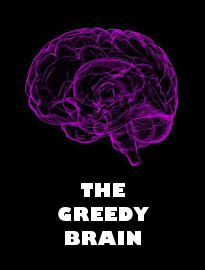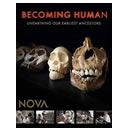What Makes Us Human?
 Is our behavior really more than a matter of animal instinct? From gorillas that use sign language to make obscene suggestions to pinheaded people who can't use language at all, pigs who have learn to hoover and sheep who fall in love, this series explores what really sets us apart from the beasts.
Is our behavior really more than a matter of animal instinct? From gorillas that use sign language to make obscene suggestions to pinheaded people who can't use language at all, pigs who have learn to hoover and sheep who fall in love, this series explores what really sets us apart from the beasts.
Evolutionary scientist Dr Armand Leroi explores how and why we became human, but instead of looking for clues in ancient fossils, he seeks out the oddities, aberrations and mutations around us in the present.
What is it that separates us from our animal cousins and makes us essentially human? For centuries, philosophers and archaeologists have asked this question, but at a fundamental level the answers have remained a mystery, until now.
Having argued that the essential difference between ape and man is our big intelligent brain, Dr Armand Leroi explores how the special qualities of this brain have enabled us to dominate the planet.




Anyone know where to find this video I can't even find where to buy it?
I have even emailed Dr. Leroi several times but, no reply.
By the way, I can't speak for anyone else but, I am smarter than other animals.
Sure, that and a pair of testicles.
My oh my that was a lot of assumptions from the old reductionist paradigm of science... This is out of date at best, pseudo scientific at worst. How long is science gonna be burdened by the separation fetish of the bible between "us" and "them"? Move on to critical anthropomorphism already, PLEASE...
"Alex cannot build sentences" Well; that's hardly fair. Alex is responding in a type of language that is far from his nature, but that he has still been able to learn. Humans haven't desiphered the many nuances and facets of the many bird languages yet. But we know it is very complex. We know that there are dialects among whales, birds and other species. We know that they communicate at a complex level. Judging them solely on how they master OUR language, when our best minds have been able to understand THEIR language at only the most basic levels is unfair, and hardly scientificly valid.
Apart from this (and Dr Armand Lerois fixation of slowly turning his face towards the camera with a serious expression, again and again throughout the documentary) there was quite a lot of interesting information here, Still worth watching. But just don't base your thoughts on intelligence/consciousness solely on this...
having watched the 1st part, i'm still not convinced that people r smarter than other animals. he says we have a bigger ability to solve problems. but we wouldnt understand what problems a bird has or solves anymore than a bird would understand people problems.
i dont think i'll watch anymore parts. i already think there's something wrong with my brain. but i think the rest of the human race is CRAZY.
i'm still not convinced that people r smarter than other animals. he says we have a bigger ability to solve problems. but we wouldnt understand what problems a bird has or solves anymore than a bird would understand people problems.
I love this. I didn't see it like that. Thanks. Well if there is intelligence measurements among humans, Id say for that comment, you serve high is the perception and wisdom apartment. I want to read more like this.
havent watched yet. if pigs and donkeys defined intelligence, they'd probably use entirely different yardsticks to measure it and find ppl to be idiots. ppl have certain abilities that other animals dont and vice versa. we just take human abilities and decide those abilities indicate superior brains. i dont believe ppl have superior intelligence.
The Nazi ideology behind improving the gene pool is a hell of a lot more ordered, fair and humane than the capitalist system style of genetic engineering he describes. This world is going to lose all its morality, just nuke it now it will be best believe me. Was Hitler really evil, come on whats evil about removing weak people from the gene pool compared to excluding them from life, shove that bollox, two tier system will lead to war unless the weak minded become slaves and i bet they will eventually. Hitler was a good guy it seems now.
what....are....you....talking about?
im talking about love, the power of nature and the evil embelishment of man
I've only gotten through part 1 so far, I'll watch part 2 when I am further ahead on some papers. I have noticed some problematic statements in part 1. First off is the tendency to portray "Other" contemporary people as if they are reflections of the past and not.. well, *contemporary* (specifically referring to people as medevil, or little changed from such and such a time period). Second, the explanations of genetics are barely at the high-school level and not representative of current understandings which call into question earlier 'beads on a string' understandings. Thirdly they de-emphasize the importance of the way the brain is wired and emphasize size. While there may be some evidence linking brain size with intelligence most courses I've taken have stressed that how the brain is wired is more important in understanding intelligence. Forthly they describe an individual with psychotic symptoms as a "sociopath". Sociopathy is distinct from psychosis. Finally, eugenics has not faded from living memory, forced sterilization of First Nations women occurred in North America at an institutional level as recently as the 1970s and 80s.
If they are getting "facts" in areas I'm informed about wrong, I have difficulty trusting the facts they present on subjects about which I'm less informed. Also a closer reading of the underlying assumptions inherent in their statements would be interesting, but I don't have the energy for it right now.
The universe being composed of atoms (dark matter aside, I don't want to get into that discussion) there really is no separation of man from the universe. It is man who places importance upon his being to use language to describe himself/herself. Without language to say "I am man" then what are we? We would not have the will to care, nor the means to ponder and exaggerate self worth. We could just all eat, s@#$, reproduce and die like the rest of the animals not placing any importance on our processes.
To quote Confucius "Those who know don't talk. Those who talk don't know"
I realize the irony in my statement saying anything at all.
Definitely worth watching the full thing, stopping half way would be a terrible shame, especially just because something challenged your accepted knowledge and provided lots of evidence in the process.
Elephants never forget, other animals have uncanny memory skills as well. Apes show the ability to walk upright while crossing water, although it is not the way they walk around permanently, they are fully capable of walking biped-ally, something they do more frequently then scientists once thought. Not including random diseases that morph bone structure, the shape of our skulls is one distinctly Homo-Sapien feature, all of our closest ancestors have differing cranial sizes and shapes allowing us to distinguish them from modern humans.
Collette, while this is a nice sentiment, expressed slightly differently by D-K 'the message is all, not the envelope it is in' is in my opinion false. The envelope you put it in reflects the object inside, if you write a brilliant letter to someone, but your envelope is covered in dirt, slightly torn, and no name on the front, well the message won't carry the same weight, and in fact may never even be received or heard of, because the way in which it appears is not conducive of the brilliant, insightful thoughts inside. Yes, the message is what's most important, but how you deliver/present it, makes or breaks whether or not people pay any attention, at least that's my take on it. Not that good things can't come in cr*p packages, but I think you know what I mean :)
If you place a chimp in-front of two upside down cups, one of which has food in it, then point to the cup with the food, the chimp will not follow your hand and pick the cup with the food in it, it will randomly decided on its own what to do. Whereas dogs as young as 6 months recognize this visual cue from humans and immediately go for the cup if we point at it and even if we briefly gaze in its direction, something chimps do NOT do! Copying and comprehending are very different things!
This is where I had a problem with the first part of the documentary and your example illustrates it perfectly. I really didn't like the example of the grape + cup the documentary used; just because the chimp "couldn't" infer where the grape was based on the researcher's signals, doesn't mean that the chimp does not have the ability to infer. From my perspective, all it demonstrates is that it is just as likely that the chimp didn't understand the human's social cues. Dogs, on the other hand, are extremely adept at understanding humans' social cues + body language as they've been our companions for so long.
The first part of the documentary seemed to diminish much of the research that has proven that animals such as primates have very rich and complex societies and communication skills - we're only beginning to grasp the extent of this kind of intelligence. So while I liked their example of the various orders of thought processes (1st, 2nd....5th) I feel it's perhaps a bit premature to make the claim that animals only possess 2nd order. We cannot simply judge them on how well they understand US; we must further observe how they understand each other.
he was looking for telepathy from the chimp, it coudnt see the grape, why would it think it would be under the cup unless it was a possibility it had encountered before, load of nonsense, the chimp thought he ate it likely and lost interest, its more plausible.
The largest and heaviest brain belongs award belongs to the Sperm Whale, weighing around 9 kilograms. Body to brain ratio winners are ants. Other species have been bipedal with grasping hands for millions of years before us. Why human beings are the only race on earth that evolved superior intelligence ? We ate the same food as any other carnivores and herbivores did for 250 millions which is 30 longer that we've had so far to evolve out of monkey ape hood. ; )
This mystery is far from being solved.
@D-K
I am so glad to have had this conversation with you. Relative perspectives never worked for me. I always had to chisel away at all possible subjective/relative perspectives till I was left with something indisputable, which i then hold precious.
To each his own. tc
Ashok: "Soul searching".. how deliciously ironic.
I too have pondered many a night on this very issue, after which I decided that classification has no priority and that defining the concept of man to myself seemed insignificant and redundant.
I opted to take a relative perspective.. makes a lot of questions simpler in my opinion.
With this: "Some say emotions and complex social structures, others say superior intellect and some simply trace it back to our ability to overcome instinctive behaviour" I merely intended to demonstrate how varied and flexible the term is. There is no consensus, personal definitions are pointless.
@D-K
Dear DK, i am sorry if i sounded accusatory, I meant no offense. I was trying to simplify the whole thing, at least in my mind.
Aren't emotions, complex social structures, and the ability to overcome instinctive behavior, examples of superior intelligence?
Even "lower animals" emote, think, have complex social structures and show self restraint. We humans as a species are capable of it to a much greater degree, depending on the degree of our intelligence. Therein lies the significance of being human. Don't we know people who emote less, live basic lives and are intemperate? They are human too.
Only if we were to understand the basic truth about who/what we are, and accept it, can we move forward to answering the big questions. This is what i have learned, and it has simplified everything for me.....
Man is a life form on earth, evolved from the primordial germ cell like any other life form and he shares the same genetic material with all the other life forms including the basest virus.
Being a life form means that he is subject to all the laws and characteristics applicable to any life form. It also means that he is not subject to anything else, including beliefs. Understanding this simplifies the most perplexing of questions.
I don't mean to sound pompous. It took me years of observation and soul searching to arrive at these conclusions.
cheers
@Ashok: I was hinting at the semantical differences that come with the different types of context when using the term "human"
Don't get me wrong, I certainly don't attribute false characteristics, nor am I a believer of any sorts, I'm just saying that while "what makes us human" is a philosophical question, the answer is clouded due to the unclarity of how individually and contextually we answer that question. Some say emotions and complex social structures, others say superior intellect and some simply trace it back to our ability to overcome instinctive behaviour.
It's complicated.
@D-K:
Do we need a definition other than "Homo sapiens"? Are we anything more?
The moment we deceive ourselves and attribute false characteristics (Divinely created in his image, has a soul, has a divine purpose in life etc.) to ourselves, philosophy fails.
True to our animal nature, we continue to lie, cheat and deceive, kill plunder and rape in the name of our beliefs.
But, with our intelligence (being human), we are eminently equipped to be socially supportive, bypass the struggle for existence to a degree, and thus enjoy our time in this wonderfully varied world.
Does that sound very poignant?
@Ashok:
You're skipping a step. First the term human needs to be defined to see what would characteristics fit into that term and since it's being so flexibly implemented, creating a widely accepted definitive definition is quite difficult.
There's a reason why philosophical questions, while often collectively asked, are individually answered.
Yes, that is exactly as poignant as it sounds.
Ha! there we go again. What makes us "Human"? We are just another species. The only thing which differentiates us from other life forms is in the level of our intelligence. We do much better than other species only in activities which require intelligence. Even regarding intelligence, we cant ascribe one single quality to ourselves which is not seen in other species, albeit to a lesser extent.
What makes us human are our genes, like what makes a mushroom a mushroom is its genes. And we are subject to the same natural laws as any other life form on earth.
What relevance does this have in light of the fact that our brains have shrunk by 10% since our species ceased being hunter gatherers?
You want to see some apes use monkey see monkey do? Watch 'Rogue Chimps' and see how they teamed up to escape, gang up, terroris, murder and run freakin free, Bruno, alpha ape is still loose today.
Smart smarter smartest!!! I will repeat it to myself so many times till I remember it. It is another thing we got from the evolution - a good memory. Sorry if that little mistake irritated some that are probably more into the shape of the words than in what the words want to say. D-K is right, the message is all, not the envelop it is in.
When you see a chimp operating a robotic arm with a joystick, and later operate it with just his mind, it profoundly changes your opinion of a chimp's learning process/capability.
This closed experiment wasn't a case of "monkey see, monkey do".. the expirement I'm referring too had the monkey/ape (i forget which) learn to manipulate a cursor on a screen via joystick, and in a later stage manipulate it with his mind trough elektronic pulses/brainwaves.
A clear case of action-reaction-reward, which is the same technique we use to housetrain dogs, and teach very small children right from wrong.
I cannot get into this discussion more, as I haven't watched this doc yet, but if John's claim is accurate, i'd agree that the statement that chimps cannot learn by watching is fallacious or at the very least unsubstantiated in itself.
@ Sam
I'm not sure what they where aiming at, but they said something that is not true-it is a simple as that. The statement that chimps can not learn by watching others is false. I'm sure you know what the guy was aiming at I do not claim to, I stopped watching after the false statement. All i am getting at is that one of his supporting statements was incorrect- I'm not sure about his general theory. From what you are saying he says that the chimps do not have the same power of association as humans- i would agree with that statement in general. They may not think to themselves "o.k. I am going to do exactly what he is doing and others will percieve us to be doing the same thing" but they certainly can see the benefits gained by certain actions and then repeat said actions.In other words I would agree with your statement, but if that is what he meant to say I think he said it poorly. I got a totally different impression than his intended message.
Thank you.
Well, tis very good.
I did, I get poetic from time to time..
Who wrote that DK? I like it
One should be judged by the merit of their message, not the formation of the words themselves.
Words are the messenger of wisdom, the messenger never reflects the speaker of the words, merely delivers portable wisdom through the medium of words.
Words not make smart, words not are smart, message is all
Thoughts that are on the surface cogent, seem less so when the writer can not spell properly or else can not use the spell check to make corrections. Smart, Smarter, Smartest
@john seals, if I understood you correctly, I think you might not have got the idea the narrator was aiming at! the theory of mind aims at studying what orders of intentions we can associate, as in the example of the Shakespeare's plot, he showed an example of a 5 order intention, while he said some animals get 2 order associations at best (as the ones in your example!, not chimps, but even small birds and most mammals learn from their mothers basic survival skills though.
thank you
John Seals: Well said!! I totally agree with you.
wait a minute- I stopped watching this on part two because they say something that is simply not true, that chimps can't learn by watching others. I have witnessed chimps learning how to fish for termites by watching other chimps do it, thier mom in this case. I have seen documentaries about chimps learning to sharpen a stick and use it to kill bush babies, a small mamal that lives in hollow trees. In this case not only are they learning to hunt with a spear but they are also learning to make a spear for hunting- all by watching others. I think almost any trainer would tell you they most definetly can learn by watching others- humans or chimps. Lot's of trainers have the lock mechanism hidden so the chimps can not see how he unlocks the latch- because if they see it enough times they will try and do it themselves. As far as I am concerned what makes us human in a physical sence is our locamotion- bipedal posture is exclusive to humans. menatally I would say it is our ability to procaess, remember, and sometimes associate data in order to predict our imediate future in both fundamental as well as abstract terms.
Natural selection does not make a person or species smarter, it eliminates those that are dumb or ill-adapted.
There is also no such thing as equality when it comes to organs, genetical (or other) defects aside, it all boils down to self-development or lack thereof.
Collette, we can only hope that natural selection will make us all 'more smarter' in the future.
Unfortunately, not every man and women, even in our modern age have evolved equally.
Anyone who says otherwise is simply uninformed. Not all human brains are created equally.
Can it be as simple as a greater level of socialization within the context of a genetic mutation?
this guy has sexy voice
First part was pretty sad to me. Seeing people taken advantage of like that seriously irks me. On to part 2..
Very interesting points. However, if the natural selection will make us more smarter, does that include only cold rationality or maybe bigger understanding of weaker ones? I like the narrator, he seems to have quite realistic predictions saying we will be judged by the content of our dna in the future... The first part about the size of the brain and intelligence I didn't like as much, because even if it relates to humen and other mammals comperatively, it does not really relate amongs humans themselves. Or seeing a person with a big head doesn't mean he holds a big sized brain?!